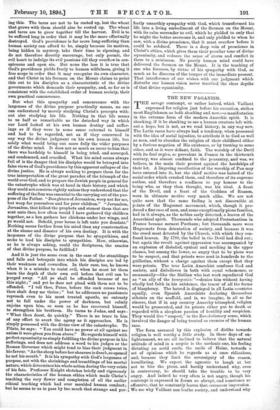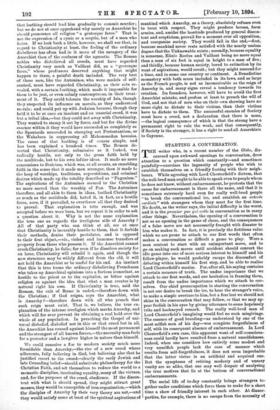THE NEW PAGANISM.
THE savage contempt, or rather hatred, which Vaillant expressed for religion just before his execution, strikes most Englishmen as both shocking and new,—a manifestation in the extreme form of the modern Anarchic spirit. It is shocking, if it be shocking to see a human creature left with- out a hope, but is not, as we read history, in any way new. The Latin races have always had a tendency, when possessed with the idea of social injustice, to attribute it to God as well as man, and to abandon the religion of their childhood either by a furious negation of His existence, or by turning to some other, and as it were defiant, faith. The worship of the Devil with its foul orgies, so prevalent in France in the thirteenth century, was almost confined to the peasantry, and was, we believe, in the main their protest against the hardships of their lot. A lingering recollection of the worship of Pan may have entered into it, but the chief motive was hatred of the social order which crushed them, and therefore of its supreme author, and therefore a readiness to pay honour to the being who, as they then thought, was his rival. A feast of the Devil, and a feast of the Goddess of Reason, were in ultimate motive very much alike. We are not quite sure that the same feeling is not discernible at points of the Huguenot movement, which, though it pro- duced a fine race of men, and some exceptionally pious families, had in it always, as the nobles early detected, a leaven of the Anarchical spirit. Thousands who adopted Protestantism in France became earnest Puritans ; but thousands more were Huguenots from detestation of society, and because it was the creed most detested by the Church, with which they con- fused heaven. By 1789, the belief in the Devil had died out; but again the revolt against oppression was accompanied by an explosion of disbelief, cynical and mocking in the upper classes, but among the lower, so angry that to be pious was to be suspect, and that priests were sent in hundreds to the guillotine, without a charge against them except that they were priests. The true Latin Anarchist confuses God and society, and disbelieves in both with equal vehemence, or occasionally—like the Sicilian who last week repudiated God as "an ally of the bourgeoisie "—denies him without having wholly lost faith in his existence, the truest of all the forms of blasphemy. The hatred is displayed in all Latin countries equally, even Spanish Anarchists declaring themselves atheists on the scaffold, and is, we imagine, in all so far sincere, that if in any country Anarchy triumphed, religion
would be prosecuted, and its priests either put to death or regarded with a sleepless passion of hostility and suspicion. They would live "suspect," in the Revolutionary sense, which involved the danger of being treated as enemies of the human race.
The form assumed by this explosion of dislike towards religion is well worthy a little study. In these days of en- lightenment, we are all inclined to believe that the natural attitude of mind in a sceptic is the sardonic one, his feeling dictating an acrid smile, the smile of Heine, towards a set of opinions which he regards as at once ridiculous, and, because they limit the sovereignty of the reason, humiliating. We expect the agnostic to laugh at but not to bite the pious, and hardly understand why, even in controversy, he should take the trouble to be very angry. And indeed he very often is not angry, though his contempt is expressed in forms so abrupt, and sometimes so offensive, that he constantly leaves that erroneous impression. We see why Vaillant can loathe society, and understand why
that loathing should lead him gradually to commit murder; but we do not at once apprehend why merely as Anarchist he should pronounce all religion "a grotesque farce." That is not the expression of a cynic or a sceptic, but of a man who hates. If we look back a little, however, we shall see that, in regard to Christianity at least, the feeling of the ordinary disbeliever has often had in it more of the savagery of the Anarchist than of the coolness of the agnostic. The Roman nobles who disbelieved all creeds, must have regarded Christianity very much as Valliant did, as a "grotesque farce," whose professors deserved anything that might happen to them, a painful death included. The very best of these men, like the Antonines, who were models of self- control, must have regarded Christianity, as their acts re- vealed, with a certain loathing, which made it impossible for them to be just, or even calmly contemptuous, in their treat- ment of it. They could tolerate the worship of Isis, though they suspected its influence on morals, as they understood morals; and could put up with Judaism because, though they held it to be at once an insolent and an unsocial creed, it was but a tribal idea,—but they could not away with Christianity. They wanted to stamp it out by force, and but for the divine essence within it they would have succeeded as completely as the Spaniards succeeded in stamping out Protestantism, or the Wahabees in suppressing all Mahommedan heresies. The cause of that loathing is of course simple, and has been explained a hundred times. The Roman de- tected that Christianity, submissive as it laoked, was radically hostile, not only to the gross faith held by the multitude, but to his own loftier ideas. It made no more -concessions to Stoicism, which was, at all events, an ennobling faith in the sense that it made men stronger, than it made to the heap of worships, traditions, superstitions, and criminal -desires which made up the totality described as "Paganism." The aspirations of the Antonines seemed to the Christian no more sacred than the worship of Pan. The A ntonines therefore, and all akin to them in ideas, loathed Christianity as much as the multitude did, hated it, in fact, as a hostile force, sure, if it prevailed, to overthrow all that they desired to prevail. That explanation is trite enough, and was accepted before we were born, but we repeat it in order to ask a question about it. Why is not the same explanation the true one as regards the irreligious side of Anarchy P All of that party who can think at all, see at once that Christianity is incurably hostile to them, that it forbids their methods, denies their postulates, and is opposed to their first object,—viz., violent and immense transfers of property from those who possess it. If the Anarchist cannot crash Christianity, he fails; for even if he dissolves society for an hour, Christianity will rebuild it again, and though the new structure may be widely different from the old, it will not hold the Anarchist or be useful for his end. An instinct that this is true turns the ordinary disbelieving Frenchman who takes up Anarchical opinions into a furious iconoclast, as hostile to the priest as to the capitalist, as bitter against religion as against the idea that what a man creates is by natural right his own. If Christianity is true, said the Roman, the cult of Rome is ended,—therefore down with the Christian ; if God reigns, says the Anarchist, what is Anarchy P.—therefore down with all who preach that such reign must exist. That is, we believe, the true ex- planation of the intense irreligion which marks Anarchy, and which will for ever prevent its obtaining a real hold over the whole of any population. In preaching the Gospel of uni- versal disbelief, disbelief not in this or that creed but in all, the Anarchist has roused against himself the most permanent and the strongest of all known forces,—the necessity man feels for a protector and a lawgiver higher in nature than himself.
We could conceive a foe to modern society much more formidable than Anarchy,—the rise of a new creed whose adherents, fully believing in God, but believing also that he justified resort to the sword—clearly the early Jewish and late Crusading belief—should substitute philanthropy for the Christian Faith, and set themselves to reduce the world to a monastic discipline, inculcating equality, many of the virtues, and, for the purposes of the creed, obedience. If the discon- tent with what is should spread, they might attract great masses, they would be susceptible of iron organisation,—which the disciples of Anarchy by their very theory are not,—and they would satisfy some at least of the spiritual aspirations of mankind which Anarchy, as a theory, absolutely refuses even to treat with respect. They might produce heroes, form armies, and, amidst the lassitude produced by general discon- tent and scepticism, prevail for a moment over all opposition, and reorganise society. They would fail in the end,—first, because mankind never rests satisfied with the nearly useless dogma that the Unknowable exists ; secondly, because equality is nonsense, Elisee Reclus and Vaillant being no more equal than a man of six feet is equal in height to a man of five; and thirdly, because human society, bored to extinction by its want of aspirations, would revolt; but they might succeed for a time, and in some one country or continent. A Benedictine monastery with both sexes included in its laws, and as large as the French people, is not as inconceivable as the reign of Anarchy is, and many signs reveal a tendency towards its creation. Its founders, however, will have to avoid the first Anarchist mistake, and profess at least to preach the will of God, and not that of men who on their own showing have no more right to dictate to their victims, than their victims have to dictate to them. The successful enemies of Society must have a creed, not a declaration that there is none, —the logical consequence of which is that the strong have a permanent right to rule the weak, and that consequently, if Society is the stronger, it-has a right to send all Anarchists to Cayenne.







































 Previous page
Previous page